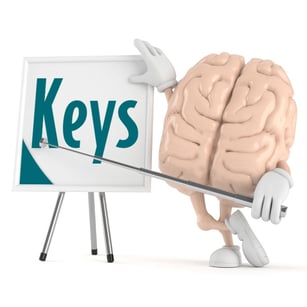A frequent question I get asked is “So, how do I change?” or "How do I break a bad habit?" Although change doesn't happen overnight, the good news is that the latest brain science proves that we can change! One thing is for sure: the quality of our lives is an accumulation of our habits.
You're either forming healthy habits that create a better life, a happier self, and a more loving relationship with yourself and others. Or you are reinforcing bad habits that inhibit your best self and life. Which are you doing? Learn how to change and break those habits that keep you stuck!
Estimated reading time: 4 minutes

Heartmanity is proud to partner with outstanding companies that we wholeheartedly recommend so this post may contain affiliate links. This means if you click on a link and purchase something, we will receive a commission at NO extra cost to you. Thank you for supporting Heartmanity's mission!
Yet, breaking unhealthy habits can be hard. Maybe you’ve tried so many times and ended up at the same place so you start believing it’s impossible to change. Perhaps you’ve even begun to think that somehow you’re missing a willpower gene or your relationship will never work out.
Well, lucky for you, helping people learn how to make the changes they want as quickly as possible is my forte.
When you have the right tools, change is possible!
Find the Unmet Needs Driving Unwanted Habits
With all change, one of the most powerful keys is not to try to STOP doing anything but rather to listen to the unmet needs driving unwanted behavior. For instance,
- Do you need soothing and comfort? (and that's why you're grabbing that pint of Häagen Daz?)
- Are you frustrated because you're not more motivated? (Perhaps, you need more rest and you've been working too many hours.)
- Are you lonely or do you need alone time? (What would feel more nurturing: time with friends or a night by yourself?)
- Do you need to feel heard or valued? (Is there a relationship that has made you feel invisible or undervalued?)
- Are you bored and have a need for greater adventure?
Get curious about what motivates the choices and behaviors you don't want. Remove the judgment on yourself. Approach "bad" habits as simply information about what you need and desire.
Being conscious and practicing mindfulness is a great tool to awaken you to your true desires and needs. Getting out of unconscious behavior is the essence of making a change.
Helpful reading: "How to Change Habits and Create a Life You Love!"
For a brain fitness app, check this out! A fun way to keep your brain exercised!
8 Keys to Replace Bad Habits with Positive Habits that Support the Best YOU!
When you want to know how to break habits, here are some keys that will accelerate any desired change based on what we know about the brain and rewiring it.
KEY #1: Be specific about what you want.
The clearer and more specific you are about the change you’d like to make, the more effective you will be.
KEY #2: Shine a light on your mind chatter.
Write down all the things your mind says to let you off the hook when you set out to create a new habit. My favorites are “I’ll start tomorrow” or “Today’s not a good day because I’m feeling __ ____ .“
KEY #3: Replace your negative, self-defeating thoughts with thoughts that support
your goal.
For instance, “I’ll start tomorrow” could be replaced with “No, NOW!” Or “Today’s not a good day because I’m feeling __ ____“ could be replaced with “Hmm… I wonder what I could do to feel better right now.”
KEY #4: Explore what unmet needs are fulfilled by your unhealthy or unwanted behaviors.
The more in touch you are with what you’re trying to accomplish, the more likely you are to be successful in changing a habit. Every behavior has a purpose.
And if you've ignored your own desires or feelings for years, it may take some time to get acquainted with yourself. Under every feeling-stuffer is an unmet need so get curious. And remember, feelings are accurate signposts to your true self and stepping stones to transformation—so listen!
KEY #5: Set a small goal.
A minor change is easier to implement. Once the small shift is a habit, set another small goal. Big changes are harder to sustain and are often abandoned. For example, “No more junk food” might last for a day. “I’ll have a salad for lunch” is far more likely to be sustained. The brain pays attention to what we repeatedly do, not to what we occasionally do.
KEY #6: Mentally rehearse the outcome you want.
Brain research has shown that when we rehearse the result we want, the frontal lobe (the higher, logical part of the brain) is activated. The richer the colors and the deeper the feelings, the more the subconscious experiences your visualization as real; this then catapults you into faster change.
Related reading: "How to Use Visualization to Get Amazing Results!"
 KEY #7: Link your new action to a familiar routine or habit.
KEY #7: Link your new action to a familiar routine or habit.
If we utilize well-established habits, changes happen faster and easier. When we link a brand-new behavior with a familiar habit, it’s like combining a small stream with a Class 5 river.
For example, every day you eat lunch at your desk. Build a habit with that routine. Take ten minutes to relax, sit back in your office chair, and set a positive intention. Or visualize how you want the rest of your day to go or see yourself successful in your afternoon presentation. This simple action done consistently can have an enormous impact on your life.
Or let's say that your husband or boyfriend reads the newspaper each morning and it typically annoys you. Use his habit of reading the paper as a reminder to you to connect lovingly (instead of being frustrated that he's not talking with you). Go over and put your arms around him and give him a big kiss. Now your brain is cued to remind you to take action that supports your goal, i.e., a more loving relationship.
Linking a new behavior to one that is already on autopilot maximizes ease and adds enormous momentum to any potential change.
Related reading: "Break Bad Habits by Rewiring the Brain!"
KEY #8: Make a commitment to act on the new behavior no matter what!
If you’re going to walk, walk. Pick a time that is most convenient to set yourself up for success, but if you’ve forgotten to walk and it’s 9:30 p.m., do it anyway. This determination shows you that you mean business and also makes it unpleasant for you to forget the next day.
So there you have it! Try these steps and make change easier and more fun!
Related reading: "Building Healthy Brain Habits: Dream Big, Start Small."
If you'd like to try my favorite way to keep my brain sharp, check this out!
Want to know how to get rid of bad habits once and for all!? Try one of our coaching programs or sign up for our newsletter below.









